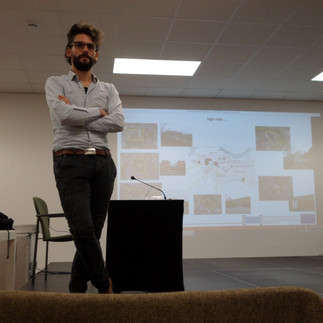From Giuseppe Campos Venuti to Federico Oliva: XX Century Italian Urbanism and the “Austerity” Chall
- Apr 4, 2018
- 2 minút čítania
The lecture “Giuseppe Campos Venuti in XX century Italian urbanism and the “austerity” challenges for the future”, took place on 20th March 2018 in Barcelona, during the course “Regional and urban economy” held by prof. Carlos Ramiro Marmolejo Duarte in the frame of “MBArch.” (Master’s degree in “Advanced Studies in Architecture - Barcelona”. Specialization line in “Urban and Architectonic Management and Valuation”), having as objective the promotion of the research in the fields of planning and management of the city and the territory (http://www-cpsv.upc.es/MBArch-GVUA/indexENG.htm). This experience gave me the opportunity to explain in a foreign country the XX century Italian urban planning, based on my personal research included in my thesis. It also includes the exploration of the history of planning and management of the city, and this lecture gave to students (mostly from South America) an analysis of the career and thinking of one of the most influent Italian urban planner in Europe, Giuseppe Campos Venuti (Rome, 1926), ancient professor at Politecnico di Milano (Italy), member and ancient president of the Italian National Institute of Planning (Istituto Nazionale di Urbanistica, INU, founded in 1930) and planner of a number of innovative General Development Plans in Italy, also in Spain, promoting the General Plan of Madrid (1985).
The lecture analyzed the evolution of the notions and concepts of a key figure of Italian urbanism in the period after the Second World War, Giuseppe Campos Venuti. The aim was to highlight the ideas and beliefs of the Italian urbanist, his legacy and a thought that is reflected in the analysis and evolution of the contents of the Italian urban plan and how urban and territorial development evolves in the country.
It analyzed the belief of Campos Venuti from the 1960s and the modality of studying urbanism, focusing the attention on the role that the capitalist real estate regime had played in the action of the “traditional” urban plan and the contrast with the model that Campos Venuti proposed to offer an alternative to traditional urban practice, as the auspicious policy of “austerity” that implies the so-called five “safeguards”. In the 1990s, Federico Oliva linked to the ideas of Campos Venuti, giving continuity and evolution to the way of studying urbanism: this led to the unfolding of the Italian urban plan in two instruments: the structural plan and the operational plan.
Briefly, Campos Venuti’s belief is fundamental to understand the current situation of Italian urbanism and, in general, of Italian society: nowadays the relevance and coherence of his intellectual contributions are still valid in the context of crisis that currently shakes the capitalist system of European countries.
Text and photo: Federico Camerin







Komentáre